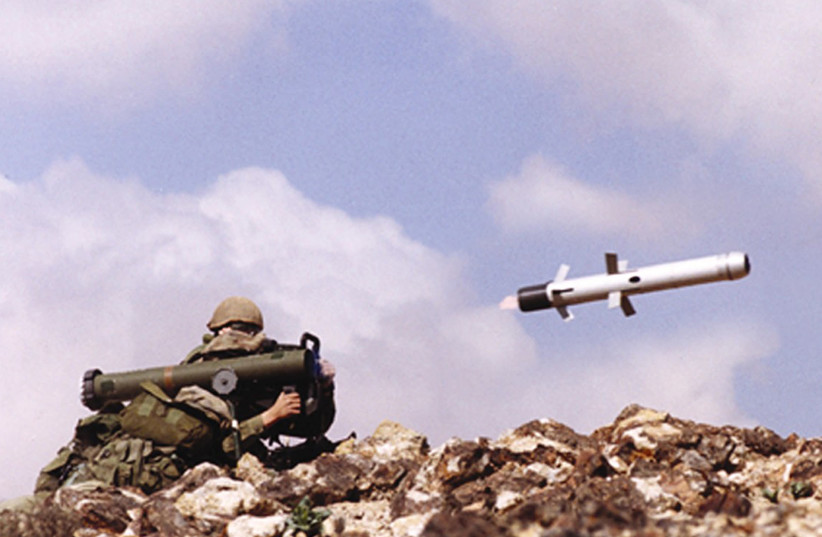Close to 60 Israeli defense companies will be participating in EUROSATORY, Europe’s leading land defense and security exhibition in Paris.
The biannual exhibition will take place between June 13-17, 2022, at Paris-Nord Villepinte Exhibition Centre. Among the themes of the exhibition are climate change, threats posed by cyberattacks, anti-electronic jamming, robotics, artificial intelligence and more.
The Israeli companies will unveil and showcase new advanced technological solutions and capabilities that address the various security challenges faced by countries around the globe.
What is Israel showcasing?
Among the various technologies that will be presented include autonomous drone interceptors, electro-optical missiles, personal tactical communication over satellite, hybrid drone robots for indoor and underground tunnel-scanning missions, thermal imaging systems based on AI and deep learning and more.

“Eurosatory is one of the largest and most important defense exhibitions in the world, and we are very proud of almost 60 Israeli defense industries participating this year,” said the head of the military exports unit of the Defense Ministry (SIBAT) Brig.-Gen. (Res.) Yair Kulas.
"We will present a wide array of ground-breaking technologies which integrate broad operational experience and provide solutions for varying challenges both on the current and future battlefields."
Defense Ministry (SIBAT) Brig.-Gen. (Res.) Yair Kulas
Eyes towards Jerusalem
A leader in defense, the world has for many years looked to the Jewish State for security and intelligence and Israel’s defense industry has leading international companies exporting to countries across the globe.
Among the Israeli companies that will exhibit include defense giants Rafael, which will showcase mobile configurations of the Iron dome, or I-DOME, the SPYDER Air Defense System, or the Spyder All-In-One as well as its family of SPIKE missiles. A representative of Rafael told The Jerusalem Post that the state-owned company will also be unveiling a new missile and new missile incorporated concept.
Israel Aerospace Industries will display a variety of systems, including the Barak MX Air and Missile defense system, Tactical Heron Unmanned Aerial System, as well as the ROTEM and MINI HAROP loitering munitions.
Elbit Systems will also be at the exhibition and will display a number of their advanced technologies used by Israel and countries around the globe.
So what else is there?
Other small and medium-sized companies exhibiting at EUROSATORY include Beesense Sensor Solutions, Bird Aerosystems, Bluebird Aero Systems, Camero-Tech, General Robotics, Gilat Telecom, Goldtec Technologies, Hagor Industries, Istar U.A.V, Israel Weapon Industries, Magam Safety, Magna BSP, Marom Dolphin, Reshet Graf, Roboteam Defense, Robotican, Optical Lab, Semiconductor Devices, Shladot, Skylock Systems, Smart Shooter, Steadicopter, T.A.R. Ideal Concepts and more.
Aeronautics will also participate in the exhibition and will showcase their new Trojan unmanned hover plane (UHP) that can support challenging operational missions while performing point-to-multipoint intelligence, surveillance and reconnaissance missions. The UHP has a 2.5-hour flight time, can reach a range of 150 km. and has a capacity to carry multiple payloads up to 12 kg.
“The Ministry of Defense integrates and supports the Israeli Defense Small and Medium Enterprises as an important part of the ministry’s value system,” said Amira Ilany, director of Europe and North America division in SIBAT. “We deem it of the highest importance to strengthen these innovative industries, and many of them will be participating in the upcoming Eurosatory exhibition.”
The show takes place as Ukraine continues to push back invading Russian forces and Israeli defense officials have said that the war in Ukraine as well as other global conflicts has led countries around the world to increase their defense budgets.
Military exports by Israel brought in $11.2 billion dollars last year, with 41% attributed to sales in Europe – an increase from 30% in 2020.
“Europe is one of the most important markets that we have,” Ilany said, adding that “there is interest in Israeli cutting-edge technologies all over the world. With our experienced, operational background, our technologies are highly appreciated all over the world.”
"With our experienced, operational background, our technologies are highly appreciated all over the world."
Amira Ilany, Director of Europe and North America Division in SIBAT
While the significant increase in defense exports in 2020 was not related to the war instigated by Russia, “unfortunately, the war between Russia and Ukraine once again proves to the world what has always been clear to us – that security is a national need for every country and is not a luxury,” said Defense Minister Benny Gantz in April.
Though “geopolitical wars are of course unfortunate and awful,” the need for security will lead Israel’s exports to increase even further, Gantz said.
A March report by the Stockholm Peace Research Institute (SIPRI) found that while global trade in major arms declined by 4.6% over the past year, imports of major arms by European states were 19% higher between 2017-2021 than between 2012-2016 and accounted for 13% of global arms transfers.
